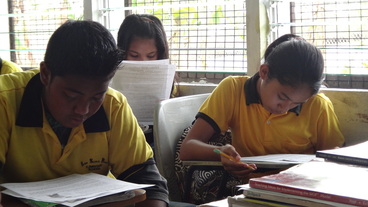 Students at Sokehs Pah Elementary _ I remember in college I would begin each semester imagining myself conducting a perfect academic symphony – reading all material twice, completing all assignments early, breezing through exams, and writing an amazing, well-researched final paper. While I did well in school, my symphony was never on the level of Mozart or Tchaikovsky. Indeed, once the semester got underway it was always harder than imagined to maintain momentum. Semester after semester I learned the same lesson. I know I’m not the only college student, past or present, who can identify with this story. When I came to Pohnpei I remembered the lesson. I still envisioned a symphony – working with principals and shaping them into better leaders, exposing teachers to new techniques, motivating students to commit themselves to their education – all in an effort to make a deep and lasting change on the education system in Pohnpei. This time though, I knew it wasn’t going to be a smooth ride. Right now we are in the thick of it. We are teaching in the schools every week, working to improve our program and building for the future. As you might have gathered through past posts, we face our fair share of obstacles every day here in Pohnpei. Several times we have pulled up to an empty school due to a funeral or an unfamiliar holiday. Perhaps our largest obstacle that I have hinted to in my previous two posts is the teachers’ lack of English skills (see picture below). Given obstacles like these, it’s not surprising that each of us has asked “Can we really make a difference here?”
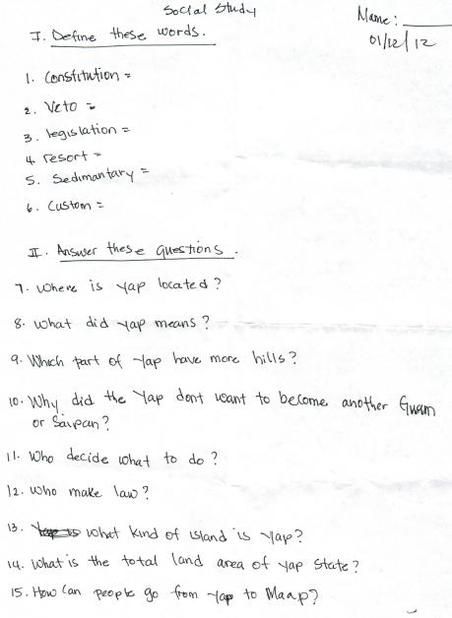 Worksheet found in one of our adopted schools _ When not working, I have been doing a lot of job searching over the past few months looking at what I am going to do post-Pohnpei. Throughout my research I have been astounded at the incredible number of non-profit organizations that exist. There are literally thousands and so many of them are doing the exact same thing. I believe this is the case for many reasons, but I think a main one is because it is exciting and commendable to start something new. While there are obviously many non-profits that do great work, I can’t help but wonder how many of these organizations started off with lots of momentum and slowly faded away when things got tough. It’s easy to start a new program or initiative and to set goals. While most of us have never started a non-profit organization, most of us have set goals, including resolutions a couple months ago. When we share our goals we can make ourselves sound quite accomplished and respectable. As my favorite author Donald Miller brought to my attention, we shouldn’t share our goals. As Miller writes, studies have shown that “when you share a goal publicly, your brain enjoys the sharing in the same way it enjoys the achievement itself, and you’ve lost some of your motivation.” Instead, we should focus on the work rather than any positive publicity from the admirable work we are doing. We should be proud of what we accomplish, not what we say we will accomplish. Ultimately, the strength of MAHI International’s work here in Pohnpei rests on its mission. Specifically with our education program, we are addressing a desperate need. As long as we continue to be blessed with the resources to execute this work, we will continue to persist in our efforts. Like everything on Pohnpei, our progress is slow. In many ways, living in Pohnpei is like living in a different world. It’s not anything new to acknowledge that the modern world is run by instant gratification, with people constantly distracted by the beeps and buzzes of technology. I remember going on a run to Red Square on Georgetown’s campus when I was interning in Washington, DC and stopping for a few minutes to witness how many people were on their cell phone. I ended up staying 20 minutes and literally saw every single person, well over 50 individuals, all talking or texting on their cell phone. It has been challenging to adjust to the slow pace on island, including living without a cell phone. Education reform on any level, anywhere in the world, is incredibly difficult and takes time. The fact that we are seeking to reform the education system on Pohnpei only exacerbates this fact. Despite the ever-present obstacles, I’m learning that only those individuals and organizations that diligently stay the course hold the opportunity to create positive and lasting change.
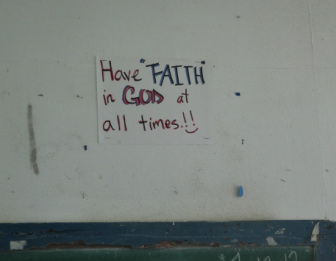 A sign in one of our adopted schools _ One area that has always interested me is the intersection of faith and politics. It interests me so much in fact that I majored in Political Science and Religion. Ever since I declared in these two majors, I have always heard, “Well, that’s an interesting combination.” It’s a long story how I ended up studying these two topics which are touchy alone, but completely explosive when combined. Part of the story involves my affinity to debate. Those who know me know I love to debate (not to be confused with arguing) and I often said throughout college that I was studying the two topics that were the catalyst for the most “spirited conversation.” In retrospect however, I see my studying of politics and religion as a great decision, for two central reasons.
First of all, I learned how to think critically and write. I can’t imagine two skills more essential for success than these. Confronting conflicting theories and paradigms forced me to think for myself, draw my own conclusions and articulate my ideas. Secondly, what I have realized while here in Pohnpei about these two areas is by studying Political Science and Religion, I essentially majored in “Institutional Studies.” As I mentioned in my last post, studying political science involved learning about political institutions and the principles and conduct of government. What is more “institutionalized” in the truest sense of the word than government? There are clearly set rules and regulations with various laws and policies that dramatically impact the citizenry under control of that government. Religion also is encased in institutions, with various faith traditions producing their own rituals, governed by their doctrine, ultimately seeking to influence people’s lives. It’s important to note here that when I say “religion,” I’m referring to the institutionalized framework, such as the Church, rather than an individual’s personal faith journey.
Here’s what I find fascinating – government, in its most basic form, is seeking to organize and establish order in a chaotic world. It does this through creating laws and allotting power to groups and individuals to be held responsible for upholding stability. Religion on the other hand, sees a chaotic world and seeks to establish order through faith in things we cannot see, or rituals which will transcend the mundane of this world and create order in either this world or the next. While most Americans are familiar with the separation of church and state, it’s interesting to note that in a way, the “church and state” (read: religion and government) are seeking to address the same fundamental need.
Some of you are probably wondering, “What does this have to do with Pohnpei?” Well I have found here that there is no separation of church and state whatsoever. First, some background – almost the entire population is Christian and most are “active” in their faith by being involved in a church. Actions outside of Sunday morning for many though provoke questions of how genuine their faith is. I have seen mostly Protestant churches, though there are plenty of Catholic churches revealing the Spanish influence on Pohnpei. My experience so far has showed the churches here to be extremely institutionalized. It has been disheartening as a Christian to see churches feud over petty differences, demonizing their fellow brothers and sisters in Christ, while raising themselves up as “better” than those “other” people. My theory is that because there is such a small population to evangelize that churches become extra competitive, dividing for silly reasons and condemning all those who aren’t part of their church.
Despite the differences between the churches, there are signs of religion everywhere. Examples include Bible verses posted in government offices, prayers being recited before government meetings and everyone saying “Merry Christmas” in December rather than the politically correct “Happy Holidays.” I have also noticed religion’s influence in the schools. The most notable example is when we went to a school and the entire school was going to Catholic mass for the morning. Perhaps I should remind you that we work in public schools. That was a real eye-opener for me. I’ve also witnessed plenty of signs in the schools like the one above, signs you would expect to see in a Christian school.
Given the pervasive nature of religion in Pohnpeian culture, I have come to the conclusion that Pohnpeians are more inclined to look toward religious institutions rather than government institutions to create order. I believe this is the case for multiple reasons. First, the current government isn’t “theirs.” Yes the Federated States of Micronesia have an official Constitution and are a sovereign nation. Their National Constitution details how there are three branches of the government, executive, legislative and judicial, with checks and balances throughout. Each State has its own government while it is also part of the national government as well. Does this sound familiar? Without mixing words, the FSM essentially copied the United States Constitution. Hey, it’s not a bad template, but again, it’s not “theirs.” Something that is “theirs” is the traditional leadership, which still has an extremely large influence, arguably more so than the elected leaders. The Nanwharki (nan-war-kee), i.e. the Chief of each municipality, along with the other respected leaders, have considerable power and represent a critical part of Pohnpeian culture.
Christianity might not be “theirs” either – after all, the locals had their own religion(s) before the white man appeared. This is true, but missionaries arrived more than 30 years before Spain claimed Pohnpei as a colony in the 1880s and overall, Christianity has been adopted as part of Pohnpeian culture. As Pohnpei is a homogenous society I don’t see a particular problem with the amalgamation of religion and government. In America, the melting pot of the world, what I see every day with the influence of religion in government and daily life here in Pohnpei would not be tolerated. For now, witnessing this dynamic in Pohnpei is yet another cultural experience for me.
I know I mentioned at the end of my last post I would discuss the largest obstacle to education reform in Pohnpei. I decided though it’s nice to mix up my posts rather than just post every week about education. So I’m going to hold you in suspense for another week.
 A recent rainbow witnessed on the water off the coast of Pohnpei
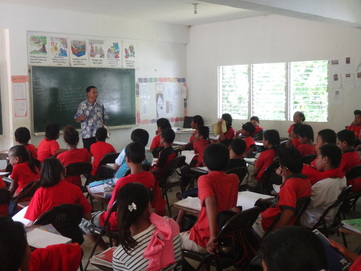 Mr. B teaching at Pohnlangas Elementary School _ When I think of the word “policy” in a government context, I naturally think of government red tape amidst a giant world of bureaucracy that hinders any forward progress. After spending four years in college studying political institutions and the principles and conduct of government, including spending eight months interning in Washington, DC, I have become somewhat jaded and weary of bureaucracy. While this frustration with “the establishment” is understandable, I have been constantly reminded that despite the sometimes perceived barriers bureaucracy can impose, there is a momentous need for strong and sound policy. Without being too brash, many of policies here in Pohnpei just plain stink, which is of little significance as the existing policies are hardly ever enforced. One policy in particular demonstrates the remarkable need for reform. Students here are not taught in English until 4th grade. However, when they enter 4th grade they are handed the same 4th grade Math, Science and English textbooks given to their counterparts who are the same age in America. Unless a child has been raised in an English-speaking household in Pohnpei, which I doubt exists, this student is expected to go from knowing hardly any English to reading at a 4th grade level overnight. It simply makes no logical sense. The argument goes that the locals don’t want to lose their local language by teaching in English beginning in 1st grade. This is an understandable and valid point. I would counter however that in many places throughout the world, students are learning in both their native tongue and English from the beginning of their education, becoming proficient in both languages. Put yourself in the shoes of that 4th grade student handed a 4th grade Science textbook. It might as well be written in hieroglyphics. Progress is made, but at a very slow pace. I have learned the importance of a student’s “instructional reading level.” If a student who is reading at a 1st grade level is handed a 4th grade textbook, he/she is going to become quickly frustrated and discouraged. This inevitably leads to a student not wanting to learn and likely having a negative approach to education for the rest of their life. If that same student is handed a 1st grade level book though, he/she will make progress and move up to the next reading level. This information is critical and explains why we spent two months assessing and compiling each student’s instructional reading level. So from the very beginning, each student is already starting three grades behind. Despite this being a horrible policy, I wish it was enforced. The fact is after traveling to and assessing dozens of 6th, 7th and 8th grade classrooms throughout Pohnpei, I have only witnessed one classroom being taught in English. Even English lessons are being taught in Pohnpeian. When I first discovered the “starting out three years behind” phenomenon, I instinctively thought we should petition for a policy change so students would start being taught in English in 1st grade. After visiting so many classrooms though, with no enforcement of the current policy whatsoever, I realized that would be a gigantic waste of time. Let’s recap: students in Pohnpei don’t start learning in English until 4th grade and are, except in rare circumstances, never actually taught in English, from what I have witnessed through the 8th grade level. I hate to say this, but it gets worse. Much, much worse. I’m going to save for my next post what I believe to be the largest obstacle for education reform in Pohnpei. This is just one policy that matters among many here in Pohnpei. It has become obvious to me throughout this experience that the environment in which a student learns is just as important, if not more so, than a student’s innate abilities and commitment to learning. Just look at that student receiving that 4th grade level textbook. He’s not dumb. He’s a product of a failed system. On a lighter note, this weekend a few of us had a nice short hike up a little mountain that is lovingly called “Chickenshit.” I forgot to mention in my Nan Madol post one legend of how Nan Madol was built. The story goes that chickens carried the large columnar basalt rocks across the island. Apparently, these chicken “relieved themselves” on this part of the island. The little mountain is coned shape, and I can see how the locals could see how it looks like…well, ya know. Pictures below! Lastly, this is my most recent post since my Giants were victorious in Super Bowl XLVI! Here are some glorious highlights of the epic game!
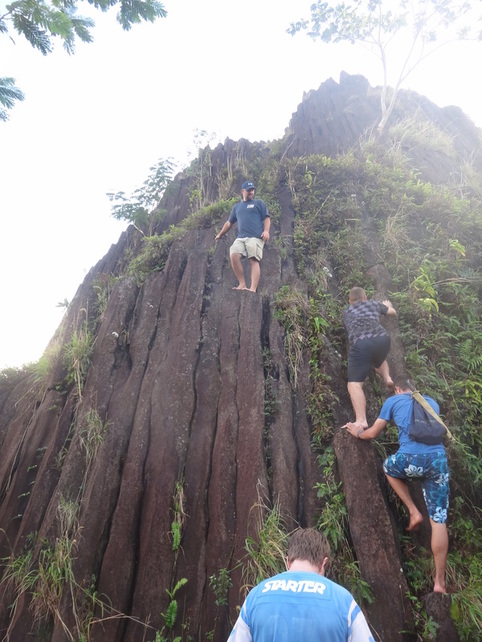 Climbing up Chickenshit. Nope, that wasn't a type-o.  Panorama from atop Chickenshit  Gigantic pig I saw on the side of the road today in Madolenihmw _
The opinions expressed in this blog are solely those of Drew Robinson.
_ I thought a good post would be to take you through a normal day here in Pohnpei, detailing the work of the MAHI International Education Team. I then quickly realized that there is no such thing as a “normal” day here. This week was a prime example of the erratic Pohnpei schedule. We’re scheduled to go to our adopted schools on Monday, Tuesday and Thursday, with Wednesday and Friday acting as buffer days for inevitable schedule conflicts. If the schedule holds, my Wednesdays and Fridays are spent tutoring students who are really behind, researching and writing grants, and making the necessary preparations for our time in the schools. I also plan to work at the Department of Education to help assist in policy changes to improve the level of education provided throughout Pohnpei. With that information, let’s get into the week! Monday January 30 On Mondays we travel to Pohnlangas Elementary School, the largest and furthest school in our program. Mr. B and I usually leave Kolonia around 9:00 to arrive in time. I was informed early in the morning though that we wouldn’t be leaving until 10:30 as Mr. B had to attend a funeral. I wrote about funerals shortly after I arrived as a major part of Pohnpeian culture. When talking about the funeral dynamic in Pohnpei to friends and family back home, I often get the initial feedback of “Well, it’s a funeral, someone close to them died, of course it’s a big deal.” While this is true for those close to the individual that passed away, the funerals here are more of a large community event than a traditional American funeral. These funerals put families in debt for years and are a large impediment for progress on the island. How, for example, is a local to invest and start a business, if every time he saves up enough money he needs to spend it all, his entire savings, on a funeral? Mr. B wasn’t close to the person that died, but he is an influential member of his community and high-ranking in the traditional leadership on the island and needed to be there. He picked me up and we drove past the funeral. We were running early and stopped by for me to have the cultural experience of visiting a Pohnpeian funeral. My first reaction was being surprised at how many people were there. I haven’t been in groups larger than 20-30 people during my time here, so it felt very odd to be around 150-200 people. Certainly, I will experience reverse culture shock when I travel home! Beyond all the people, it was impressive to witness the massive amount of resources gathered there. I counted over 20 large Sakau plants (which are very difficult to grow) and over 15 pigs. As I have mentioned, pigs are a sign of wealth in Pohnpei and contributing a pig to a funeral is seen as a major sign of respect. Despite my perceived large size of the funeral, Mr. B said it was an average-small funeral. When a very influential member of the community dies the funerals can get truly massive - imagine 60-70 slaughtered pigs! For this funeral though, seeing all the enormous pigs cut in half and children playing with them was most definitely a unique cultural encounter. 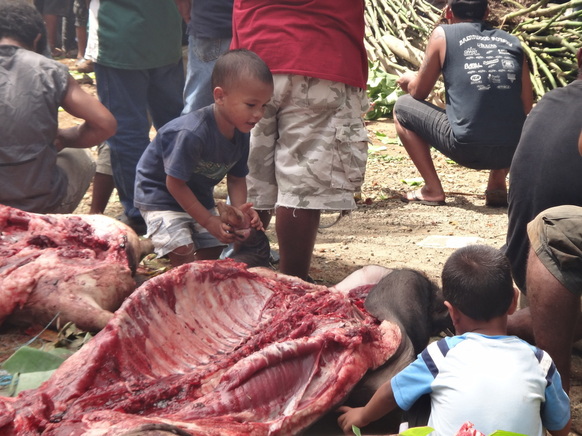 Children playing with a pig at a funeral We continued our drive to Pohnlangas, finishing our 70-minute drive and arriving before lunch was over. We normally teach six classes at Pohnlangas (two for each grade - 6th, 7th and 8th), but combined the classes in each grade to accommodate for our late arrival. I used the Hooked on Phonics program, reviewing the basic letter sounds I previously taught. I then took out the note cards we used to assess all our students during our reading level assessments in October and November. I went through each grade level, correcting mistakes and noting tendencies. I’ll elaborate on my found Pohnpeian tendency in my Tuesday notes (below)! After our three classes, we got back around 4:30 or so and I headed to tutor two children (ages 8 and 11) who recently arrived from Japan. Tuesday January 31 On Tuesdays we work in ESDM Elementary School in the morning and Sapwalap Elementary School in the afternoon. Both of these schools are located in the municipality of Madolenihmw (Med-ole-in-e-um), with ESDM being a 45-minute drive and Sapwalap almost an hour. The normal classroom I use at ESDM was occupied so I had to use the office and adapt to not having a chalkboard. Pen and paper wasn’t as good, but it did the trick. Mr. B and I stopped by a container store on our way to Sapwalap and picked up our normal lunch of nutrition biscuits. They’re nothing amazing, but they get the job done. When we remember/if we have time, we pick up some local food, like below _:  Clockwise: Fried Grouper (a type of reef fish), Rice, Taro, and Mahi (aka Breadfruit) I noticed on Monday in Pohnlangas a specific tendency most Pohnpeians have when speaking English. In fitting with the slow pace of everything on this island, Pohnpeians often speak too slow when pronouncing English words. Two of the most common words in Pohnpeian are spoken ridiculously slow. The word for hello is “Kaselehie” (casa-layyyyyyyyyyy-leeeeeeeee-ahhhhhhhhh). Culturally, the longer it takes to say the more respect you have for the individual(s) you’re addressing. This leads to it sometimes taking literally 5-seconds just to say "hello." The word for thank you is “Kalanghan” (ka-laaaaaaaaaaaaaan-guuun). This slow-speaking tendency translated directly to their speaking of English. When asking the students to say “Certainly” every time they said “sir-taaaaaaaiiinnnnnn-leeee.” Can you see the similarity to “Kalanghan” (ka-laaaaaaaaaaaaaan-guuun)? The students got a kick out of me speaking their Pohnpeian words, but I think they understood how English words are generally spoken more succinctly. Whenever possible, I try to apply whatever I’m teaching to something the students can relate to from what I know about Pohnpei.
Also, I had fun at the schools this week teaching them what "cadence" means. I explained how it's the rhythm in which you speak. I had them drum on tables to understand what rhythm means, and played some rap music (clean rap music, I must note) for them to get an idea of what it means to speak with rhythm and confidence.
Wednesday February 1
It’s February? What? Where did January go? I’m sure I wasn’t the only person that thought this, though being 16 hours ahead of Eastern Standard Time, I likely thought it before you! This week we were still figuring out how I would be using my new-found two “free” days during the week. I spent a large part of the morning researching new ESL teaching methods. I tutored my two Japanese children earlier in the day and spent the rest of the day researching. I expect having a day in the middle of the week away from the schools will be helpful in seeing the greater picture of the issues present in the schools and how we can help. Unrelated to my work was the needed pick-me-up. One of the things I miss most about home is watching sports. As an avid Chris Paul fan, and therefore a new Clippers fan, I likely accounted for at least 20 hits of this epic Blake Griffin dunk:
_ Thursday February 2
On Thursdays we travel to Sekere Elementary School and Sokehs Pah Elementary School (also known as RSP). Both of these schools are in the municipality of Sokehs and are the closest schools, being only 15-20 minutes away. When Mr. B and I arrived at Sekere we found the school completely deserted, save a few kids playing basketball. We asked them if there was school and were informed that there was a teachers meeting all day for all the schools on the island. This is typical Pohnpei - a random teachers meeting in the middle of the week and school being canceled. I guarantee you these students don’t have the US required 180 school days a year. I honestly would be surprised if it was close to 130. We made the plan to do our Sokehs schools the next day.
It really is frustrating to have setbacks like this. I often wonder aloud if we can ever really make an impact in this place, given all the constant obstacles. Despite the frustrations, I took the opportunity to visit the Seventh-Day Adventist School to see my friend Katie, who teaches a student MAHI International mentors. We arranged for me to work with him after school on my two “off” days. I also hoped to obtain more mp3 files the school has on the computer for the rest of the Hooked on Phonics program. The Hooked on Phonics sets that were donated to MAHI International are from 1998 and have the ancient technology of a cassette. I was unable to get the mp3s on Thursday, but made arrangements to get them this coming week. The rest of the day entailed more ESL and grant research and tutoring. Not an expected day, but as you might have gathered, there is no such thing as an “expected” day here.
Friday February 3
I called our Sokehs schools early in the morning to inquire if we could teach that day. I’m told by one principal that many teachers are absent, being sick or attending a funeral. He thought it would be best if we didn’t teach because he wanted the teachers to be there. The other principal said yes (technically, he said "eeeeeeeyyyyy mein" - Pohnpeian for Yes, with the "mein" being for respect, similar to "usted" in Spanish) and we taught there in the afternoon. I spent the morning traveling around with John to various appointments. There are plenty of stories from my time tagging along with John, but I’ll leave those for another time. After teaching in the afternoon I tutored again, where it was nice to evaluate the two children and see their progress from the two weeks I have been working with them.
As you can see, there is no script for a normal Pohnpeian day, or week for that matter. When I woke up Monday I had no idea I would be attending a Pohnpeian funeral, standing in the scorching sun, smelling the sweat of the large group and recently butchered pigs. I didn't plan to use rap music to help teach English, but hey, I needed good examples of cadence in speech! And pulling up to an empty school Thursday wasn't in the game plan. This is just a very small sample among countless examples of a crazy life working on Pohnpei, full of the unexpected. Despite all the obstacles, I love how the days hardly ever blend together. While routine has its benefits, it ultimately makes life go faster – and it’s going fast enough as it is! More than anything, my time here is most definitely teaching me how to adapt and be flexible. Indeed, flexibility is paramount to accomplishing anything on Pohnpei.
So there ya have it. I only have one thing left to say: GO GIANTS!!!
|











